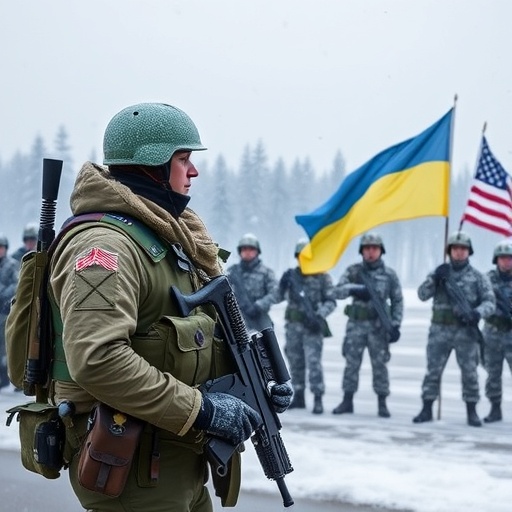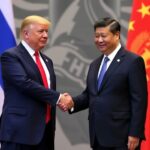Western Coalition Pledges to Erase Russian Oil from Global Markets and Ramp Up Ukraine Military Aid Before Harsh Winter
In a bold escalation of support for Ukraine, a powerful coalition of Western nations, spearheaded by the United Kingdom and France, has committed to aggressively sidelining Russian oil from international markets while fast-tracking military aid deliveries. This announcement comes at a critical juncture, just months before the war-torn country braces for its fourth grueling winter under relentless Russian aggression.
The pledge, revealed during a high-level summit in London, marks a significant intensification of oil sanctions against Russia and underscores the allies’ determination to weaken Moscow’s war machine economically and militarily. Officials from the coalition, which includes the United States, Germany, Canada, and several EU members, emphasized that these measures aim to choke off Russia’s primary revenue stream—its energy exports—while ensuring Ukraine receives the weaponry needed to hold the line against invading forces.
“We cannot allow Russia’s oil to fuel further atrocities in Ukraine,” declared UK Prime Minister Keir Starmer in his opening remarks. “This coalition stands united: we’ll starve the aggressor of funds and arm the defender with everything they need to prevail.” French President Emmanuel Macron echoed this sentiment, calling the initiative a “game-changer” in the protracted conflict that has already claimed tens of thousands of lives and displaced millions.
The timing couldn’t be more urgent. As temperatures drop across Eastern Europe, Ukrainian troops face not only intensified Russian assaults but also logistical nightmares exacerbated by harsh weather. The coalition’s vows come amid reports of Russian forces regrouping for potential winter offensives, with intelligence suggesting Moscow is stockpiling resources despite previous sanctions.
UK and France Spearhead Aggressive Oil Sanctions Push
At the heart of the coalition’s strategy is a renewed offensive on Russian oil exports, which have sustained the Kremlin’s military operations despite Western embargoes. The UK and France, as key energy importers and diplomatic heavyweights, are leading efforts to enforce stricter compliance with existing oil sanctions and explore new mechanisms to bypass Russia’s shadow fleet of tankers.
Under the new pledge, the coalition aims to reduce Russian oil’s global market share by an additional 20% within the next year, according to estimates from the International Energy Agency (IEA). This builds on the G7’s price cap initiative, set at $60 per barrel in 2022, which has already curbed Moscow’s revenues by over $100 billion. However, evasion tactics—such as reflagging ships under non-Western flags and using opaque shipping routes—have allowed Russia to maintain exports at around 7.5 million barrels per day.
“We’re closing the loopholes,” stated French Foreign Minister Stéphane Séjourné during the summit. “From enhanced monitoring in the Baltic Sea to coordinated seizures of non-compliant vessels, our coalition will make it economically unviable for any buyer to touch Russian oil.” The UK has pledged £500 million ($650 million) to bolster maritime surveillance, including drone deployments and satellite tracking, in partnership with NATO allies.
Experts highlight the potential ripple effects. Dr. Elena Petrova, an energy analyst at the Brookings Institution, noted, “Tightening these oil sanctions could slash Russia’s war chest by another $50 billion annually, forcing Putin to rethink his strategy in Ukraine.” Yet, challenges remain: India’s and China’s continued purchases of discounted Russian crude complicate the picture, with New Delhi alone importing over 1.5 million barrels daily.
To counter this, the coalition is pushing for diplomatic outreach. Bilateral talks with major Asian buyers are slated for the coming weeks, offering incentives like alternative energy supplies from the Middle East and Norway. This multifaceted approach underscores the blend of economic pressure and soft power in the fight against Russia’s invasion.
Ukraine Receives Surge in Military Aid Commitments
Parallel to the economic assault on Russian oil, the coalition has unveiled a comprehensive military aid package for Ukraine, accelerating deliveries of advanced weaponry to counter Moscow’s superior firepower. Valued at over €10 billion ($11 billion) in the immediate term, the aid includes long-range missiles, armored vehicles, and air defense systems—critical as Russian drone and missile strikes intensify.
The UK is committing 100 additional Storm Shadow cruise missiles and 200 AS90 self-propelled howitzers, with deliveries starting next month. France follows suit with 50 Mirage 2000 fighter jets retrofitted for Ukrainian pilots, alongside Caesar truck-mounted artillery units. “This isn’t just equipment; it’s a lifeline,” said Ukrainian Defense Minister Rustem Umerov in a virtual address to the summit. “With this military aid, our forces can hold key positions through the winter and push back the occupiers.”
Germany and the US are also ramping up contributions. Berlin has approved the transfer of 20 Leopard 2 tanks and Leopard 1-based anti-aircraft systems, while Washington pledges $2.5 billion more in aid, including precision-guided munitions and training for Ukrainian F-16 pilots. The coalition’s total military aid to Ukraine since the invasion began now exceeds $200 billion, with the latest pledges focusing on sustainability—ensuring a steady supply chain resilient to winter disruptions.
Statistics paint a stark picture of the need: Ukraine has lost over 3,000 pieces of heavy equipment in the past year alone, per Oryx open-source intelligence. Russian forces, bolstered by North Korean munitions, have advanced in the Donbas region, capturing villages at a rate of 10 square kilometers per week. The incoming aid aims to reverse this trend, with coalition trainers embedding with Ukrainian units to maximize effectiveness.
One poignant story emerged from the frontlines: Sergeant Olena Kovalenko, a Ukrainian artillery commander, shared via video how previous aid shipments turned the tide during last winter’s defense of Kharkiv. “We need this now more than ever,” she urged. “The cold doesn’t discriminate— it hits us all, but with your support, we’ll endure.”
Economic Warfare: How Oil Sanctions Are Squeezing Russia’s Economy
The coalition’s intensified oil sanctions represent a deeper layer of economic warfare, targeting the lifeblood of Russia’s budget. Oil and gas revenues accounted for 40% of Moscow’s federal income in 2023, funding not just the war in Ukraine but also domestic propaganda and military buildup. By pledging to take Russian oil off the global market more decisively, allies hope to accelerate the Kremlin’s fiscal strain.
Recent data from the Russian Central Bank shows a 15% drop in export earnings year-over-year, partly due to the G7 cap and EU bans. Yet, Russia has adapted by selling at discounts—up to $20 below Brent crude prices—to allies like China, which now buys 50% of its seaborne oil from Moscow. The coalition’s response includes secondary sanctions on entities facilitating these deals, with the US Treasury already blacklisting 50 shadow fleet vessels.
“This is about persistence,” remarked UK Chancellor Rachel Reeves. “We’ve seen Russia’s GDP shrink by 2.1% this year; tighter oil sanctions will compound that, limiting their ability to sustain the invasion of Ukraine.” Projections from the IMF suggest that full enforcement could push Russia’s growth into negative territory by 2025, potentially sparking internal unrest.
On the flip side, global energy markets face volatility. European gas prices have stabilized post-Nord Stream sabotage, but a sudden Russian oil squeeze could hike Brent crude to $100 per barrel, per IEA forecasts. The coalition is mitigating this through diversified imports: Norway’s output is set to rise 5%, and Qatar has agreed to boost LNG shipments to Europe by 20%.
Interviews with industry insiders reveal mixed sentiments. Maria Gonzalez, CEO of a Spanish refining firm, warned, “While supporting Ukraine is vital, we must avoid self-inflicted wounds on our economies.” Nonetheless, the pledge has galvanized public support, with polls showing 70% of Britons and 65% of French citizens backing stronger measures against Russia.
Winter Frontlines: Bolstering Ukraine’s Defenses Against Russian Advances
As the war in Ukraine enters its grimmest phase yet, the coalition’s military aid is tailored to the unique horrors of winter warfare. Frozen terrain favors defenders, but supply lines become treacherous, with mud turning to ice and blizzards halting movements. Russian forces, drawing on Siberian experience, have historically exploited these conditions, as seen in their 2022 Kherson push.
The pledged aid includes cold-weather gear for 100,000 troops: insulated uniforms, heated shelters, and drone-resistant snowmobiles. Air defense enhancements, like additional Patriot interceptors from the US, are prioritized to shield supply hubs from Russian hypersonic missiles. “Winter is our ally if we’re prepared,” noted NATO Secretary-General Jens Stoltenberg. “This coalition ensures Ukraine won’t face it alone.”
Contextualizing the urgency, Ukrainian President Volodymyr Zelenskyy reported over 500 civilian deaths from Russian strikes in the last quarter, many in energy infrastructure. The military aid pipeline now includes 1,000 drones for reconnaissance and 500,000 artillery shells—addressing Kyiv’s ammunition shortages, which have forced rationing.
Human stories amplify the stakes. In Bakhmut’s ruins, volunteer medic Andriy Sokolov described treating frostbitten soldiers amid shelling: “Every piece of military aid saves lives. It lets us fight back instead of just surviving.” The coalition’s commitment extends to humanitarian aid, with $1 billion allocated for winter fuel and medical supplies.
Diplomatic angles add complexity. While the coalition unites the West, divisions linger—Hungary’s Viktor Orbán has delayed EU aid votes, citing energy concerns. Yet, the London summit fostered rare unity, with even skeptical voices like Italy’s Giorgia Meloni endorsing the oil sanctions push.
Looking ahead, the pledges signal a long-haul strategy. Implementation roadmaps include quarterly reviews, with the next in Brussels. Success hinges on enforcement: if oil sanctions bite deeper and military aid flows unimpeded, Ukraine could regain momentum by spring 2025. Failure risks emboldening Russia, prolonging the conflict and testing the coalition’s resolve. As Starmer put it, “This is our stand—not just for Ukraine, but for the rules-based order we all cherish.” The world watches as these measures unfold, potentially reshaping the geopolitics of energy and war.








